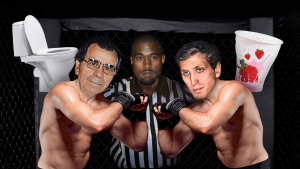
Playing Your First Chess Tournament? Read This First
I fumbled with my pawns, muttering “adjust” as I centered each one on their squares. The game hadn’t even started yet, but I didn’t want the chance of having to move my b-pawn (GM Magnus Carlsen may be able to pull that off, but I’m no world champ). I was so absorbed in my task that I didn’t even see my opponent sit down. At 4’9", holding a train-themed notebook and sporting a bright yellow backpack, he couldn’t have been older than eight. So naturally, I was terrified.
This was my first tournament in over a decade. My decision to go to the Vegas Open in August was spontaneous, and I was—frankly—underprepared. I’d forgotten toothpaste, hadn’t prepped any openings, and, worst of all: I didn’t have a jacket. It was over 100 degrees in Vegas, so the idea of bringing warm clothes seemed unnecessary. No one had explained the phenomenon of the Antarctic-style air conditioning that plagues tournament halls. I was left shivering until I managed to excuse myself to buy an overpriced Vegas-themed hoodie in the gift shop downstairs.
Entering the tournament scene as an adult can be daunting. There are no parents to hold your hand, and every small rule feels like a potential minefield. What if I touch a piece by accident? What if I forget a clock at home and my opponent doesn’t have one?

Here are five things that I wish I knew before playing my first tournament as an adult.
Get There Early
There’s nothing worse than being stuck in L.A. traffic five minutes before your round is supposed to start. I’d thought I’d left plenty of time, but all it took was one wrong exit to add a startling 30 minutes to my trip. I ran into the tournament hall, drenched in the rain, 10 minutes late. Heart pounding, I proceeded to play the worst advanced French of all time. Even though I won the game by some small miracle, it started my tournament off on a bad note.
Arriving early gives you time to get a coffee, check your pairings, and make sure all of your electronics are turned off. If you aren’t staying at the hotel, arriving 45 minutes to an hour early is a good target and gives you a little wiggle room.
Make Friends
Chess is generally considered a solitary activity. As a kid, I remember struggling to make friends at tournaments. I was usually one of the few girls playing, and at age nine, boys had absolutely no interest in being my friend. Luckily, as an adult, the issue of cooties is out of the equation, and it’s far easier to mingle. Don’t worry about going to a tournament alone. It’s generally a friendly environment. People often ask each other how the games went or lament small blunders in their previous rounds. The skittles room, a designated space to analyze games, is an especially good way to meet people.
I’ve met some amazing people at tournaments and am still in contact with them. The chess community is small, so you’re likely to see the friends you make at subsequent tournaments.
If you don’t want to go alone, chess streamer LulaRobs recommends asking a friend to join! “I always feel most comfortable going to tournaments with friends, so I’d recommend having some kind of support network. Chess is so hard already. It really helps to have someone there with you to celebrate the wins and confide in at the difficult moments.” Whether you bring along a buddy or find a friend at the event, social connection is invaluable in easing nerves and celebrating small victories.

Ask For Help
I have absolutely no excuse for not knowing how to set a chess clock. None. But no matter how long I grapple with that cursed piece of plastic, I can never figure out the right time controls. Luckily, people are usually willing to help.
While most people in the community are happy to support your journey, it’s important to block out any negativity. “Don't let anyone tell you can't do something. Most times it's a reflection of themselves, trying to project onto you.” FM James Canty says, “The key is work and positivity.”
Don’t be afraid to ask questions if you’re unsure of how something works.
Just Leap
Before my first tournament, if you asked me what the Kalashnikov and the Sveshnikov are, I’d have guessed breeds of snakes. While prepping for a tournament can make you feel more confident when you approach the board, it’s often used as an excuse to back out of tournaments. At higher levels, openings can decide a game, but it’s unlikely that messing up theory on move six in the under-1200 section will be the cause of a loss.
Being nervous is normal. “Moving from online chess to over-the-board classical chess was really scary for me. It’s a different experience, but it’s worth it,” LulaRobs recounts. Classical chess is a great way to analyze your weaknesses and learn from your mistakes. Sometimes the best course of action is just to take a breath, overcome fear, and click the register button.

Celebrate Small Victories
What makes a tournament successful doesn’t have to be winning money or having a positive score. Sometimes the best victory is just showing up, setting your clock, or playing the main line of an opening you’ve been studying. By resetting your definitions, success can be something entirely in your control.
It’s easy to base your experience on wins or losses. I had been having a good tournament with a positive score as the lowest-rated player in my category. I had been winning against 1600s, so when I saw I had been paired with a 1350 I thought I had it in the bag. Forty minutes into the game, I was up three pawns and had a winning attack. I quickly moved my rook to the seventh rank to add more pressure, completely missing a potential pin on my bishop. I ended up being forced into a trade down a piece and losing the game.
I was incredibly disappointed. I’d underestimated my opponent and gotten sloppy, even though I’d had plenty of time on my clock. Suddenly, my positive score was slipping away, and the doubts were creeping in. What if my other wins were luck? What if my instincts, which led me to a losing move, were untrustworthy? I felt mounting pressure to win the rest of my games in order to prove that the tournament was a success. Instead of enjoying a relaxed tournament surrounded by a wonderful community, I was wracked with anxiety.
Talking to a few friends, I heard story after story of similar experiences. Even titled players had painful memories of hung pieces or blundering +5 positions in a critical tournament. While it didn’t erase my disappointment, it helped ease the self-blame.
It would be unrealistic to tell you not to care about the results of your games. But remember that the most important thing that you’ll gain from your first tournament won’t be a check or rating but the experience and confidence that comes from starting on a new path in your chess journey.



